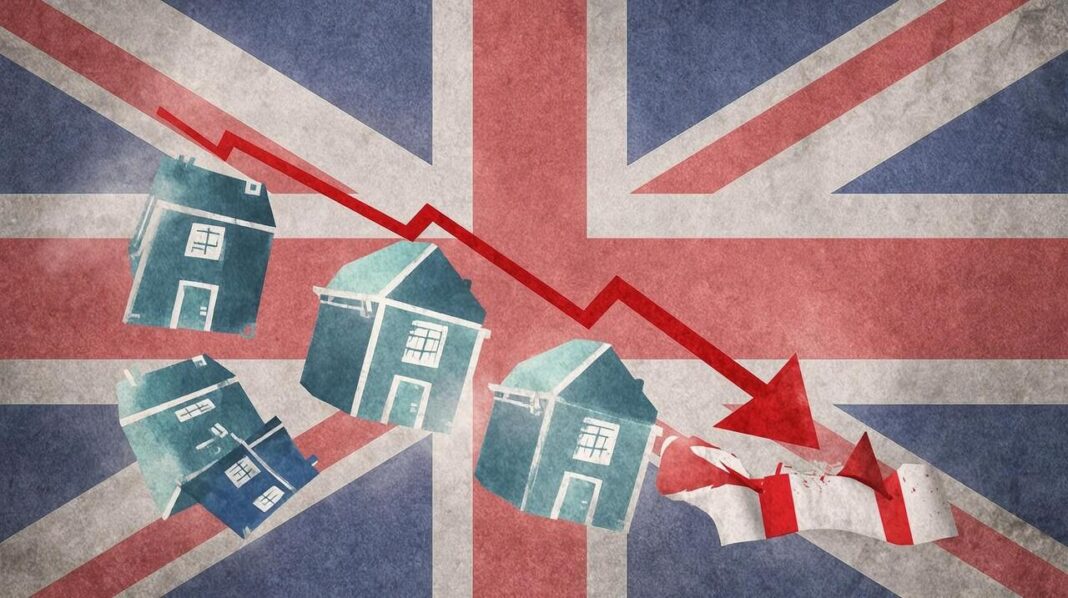Asking prices crept up slightly this month, but the market as a whole has tipped into its first annual decline since January 2024 – and it’s the south of England that’s dragging the numbers down.
Rightmove reports that average new seller asking prices rose 0.4% in September (+£1,517) to £370,257.
But that small uptick still leaves the national average 0.1% (-£502) lower than a year ago.
According to the portal, a summer of competitive pricing has finally nudged the annual rate negative, even as buyer activity shows surprising resilience.
PRICES DIPPING

Colleen Babcock, property expert at Rightmove, says: “We’d expect to see a slight uptick in new seller asking prices in September, with the traditional back to school season boosting activity heading into autumn.
“This year’s 0.4% September price rise is a little lower than the norm, which is an average of 0.6% at this time of year.
“However, prices have now dipped slightly from where they were at this time last year after a summer of competitive pricing by sellers, and it’s the south of England which is driving this small dip.”
ACROSS THE UK
Regionally, the South West is down 1.3% year-on-year, while London and the wider south continue to underperform the rest of Great Britain. The North West (+3.2%) and other regions are holding up better, leaving the West Midlands as the only more northern region to record a drop (-0.1%).
Supply is also a big part of the picture. Stock levels in the south of England are up 9% on last year, compared with just 2% elsewhere.
Homes in the south are also taking five days longer to find a buyer than those further north or in Wales. Still, agreed sales are 4% higher than this time last year, with a +5% uplift outside London and the south, and even the south posting a 3% rise.
AUTUMN BUDGET
But rumours of stamp duty reform and a possible mansion tax in the Autumn Budget are already making some movers nervous.
Babcock adds: “Rumours of property tax changes began swirling in mid-August, and with the Budget itself not arriving until the end of November, this kind of extended uncertainty can affect market activity, especially in the higher price brackets.
“Our real-time data has not yet picked up any major shifts, however it’s understandable that those who could be negatively affected by the rumoured changes might be in the process of reassessing their short- and medium-term plans.”
MORTGAGE COSTS
Meanwhile, mortgage costs have become a touch more expensive in recent weeks, with rates edging higher.

Matt Smith, Rightmove’s mortgage expert, adds: “The rhetoric around mortgages continues to be about how lenders can unlock greater affordability by allowing people to responsibly borrow more, which is encouraging for the market, particularly first-time buyers.”
With affordability slowly improving thanks to wage growth and a year of easing mortgage rates, agents and lenders alike are hoping competitive pricing and a greater supply of homes will keep buyers engaged – even if tax tinkering adds a layer of autumn nerves.
INDUSTRY REACTION

Matt Giggs, Founder of The Giggs Group in Cambridgeshire, says: “Sellers who reduced their price expectations over the summer are now creating more realistic conditions for sales, which is keeping things moving.
“We’re finding that well-presented, competitively priced homes are still attracting strong interest, and the high choice of homes for sale is also encouraging buyers.
“In Cambridgeshire, we’re seeing a steady market and aren’t feeling some of the drag that may be more apparent in London or further south. However, uncertainty around the Budget doesn’t help movers’ confidence, particularly those looking at higher-value homes. These buyers might be more hesitant to act until there’s clarity.”
OPPORTUNITY KNOCKS

Matt Thompson, Head of Sales at Chestertons in London, says: “Over the past months, the dynamics of London’s property market have changed, with some boroughs not experiencing the activity or price growth traditionally associated with a world capital such as London.
“While this has required buyers and sellers to adjust their approach, it has also created opportunities and enabled some house hunters to find properties that were previously outside their budget.
“After the summer holidays, we’ve already registered an uplift in enquiries from house hunters who are keen to proceed with their property purchase now as they believe the current market climate to be a temporary window of opportunity.
“Other buyers feel that they will have more clarity after the Autumn Budget which could then boost buyer confidence and fuel a sellers’ market sentiment towards the end of the year.”
REALISTIC PRICING

Jeremy Leaf, north London estate agent and a former RICS Residential Chairman, says: “Rightmove, though a historically-accurate identifier of market trends and enjoying 90%-plus agent coverage, only tracks asking prices. Asking prices are not achieved values but often owners’ or agents’ aspirational starting points and will determine if genuine buyers are attracted.
“In our offices, prices may still be rising marginally in more affordable areas but are softening elsewhere.
“We are still agreeing sales but the amount of choice and some unrealistic vendor ambitions are compromising activity.
“Unfortunately, only some vendors are getting the message. Unless your property is realistically priced you won’t stand out from the sizeable crowd and give yourself the best possible chance of attracting offers.”
STAGNATION DANGER

Mary-Lou Press, President of NAEA Propertymark (National Association of Estate Agents), says: “Recent stamp duty threshold changes and concern regarding the forthcoming budget have added fuel to the fire when it comes to the confidence of potential home movers.
“As mortgage products start to improve and provide light at the end of the tunnel for many, people might now be faced with additional tax to pay when purchasing, potentially adding further pressure on finances.
“House price growth is a sign of wider economic health; therefore, without clear support for people to step onto or move up and down the housing ladder, there’s a concern that this might stagnate the wider property market and prove a setback regarding restoring financial stability.”









